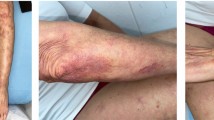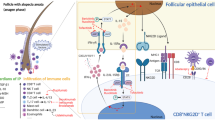Opinion statement
JAK (janus kinase) inhibitors are becoming increasingly prescribed for various conditions from dermatologic diseases to graft versus host disease in bone marrow transplant recipients. This class of drugs has been found to be truly life-changing for many, though they are not without potential adverse effects. While JAK inhibitors have not been shown to significantly increase the risk of non-melanoma skin cancer (NMSC) in large scale clinical trials, NMSC is one of the most concerning possible adverse events, and there have been several reported cases of aggressive squamous cell carcinomas, especially in our already immunosuppressed patient populations. In these patients, it is incredibly important that patients are on the lowest possible dosage of the JAK inhibitor. In addition, these patients must be routinely screened by a dermatologist with a comprehensive skin exam to ensure early detection if skin cancer was to develop. For those patients diagnosed with skin cancer, early intervention is key to optimize outcomes, and at times, multi-disciplinary care coordination is needed. In the future, large-scale studies with longer follow-up of patients would help determine whether JAK inhibitors significantly increase the risk of NMSC.

Similar content being viewed by others
References and Recommended Reading
Papers of particular interest, published recently, have been highlighted as: • Of importance •• Of major importance
Baş S, Cakir S, Ertas Y, Irmak F, Yesilada AK. Epidemiological evaluation of non-melanoma skin cancer according to body distribution. Turk Arch Dermatol Venerol/Turkderm. 2020;54:51–7. https://doi.org/10.4274/turkderm.galenos.2020.09125.
Skin cancer statistics. World Cancer Research Fund 2019. www.wcrf.org/dietandcancer/cancer-trends/skin-cancer-statistics. Accessed 16 July 2020.
Seif F, Khoshmirsafa M, Aazami H, Mohsenzadegan M, Sedighi G, Bahar M. The role of JAK-STAT signaling pathway and its regulators in the fate of T helper cells. Cell Commun Sign. 2017;15:23. https://doi.org/10.1186/s12964-017-0177-y.
Johnson NM, Prickett KA, Phillips MA. Systemic medications linked to an increased risk for skin malignancy. Cutis. 2019;104(4):E32–6.
MacFarlane LA, Todd DJ. Kinase inhibitors: the next generation of therapies in the treatment of rheumatoid arthritis. Int J Rheum Dis. 2014;17:359–68. https://doi.org/10.1111/1756-185X.12293.
Samadi A, Nasrollahi SA, Hashemi A, Kashani MN, Firooz A. Janus kinase (JAK) inhibitors for the treatment of skin and hair disorders: a review of literature. J Dermatol Treat. 2017;28(6):476–83. https://doi.org/10.1080/09546634.2016.1277179.
O'shea JJ, Pesu M, Borie DC, Changelian PS. A new modality for immunosuppression: targeting the JAK/STAT pathway. Nat Rev Drug Discov. 2004;3:555–64. https://doi.org/10.1038/nrd1441.
Seyffert JL, Kramer ON. Review of the role of Janus kinase inhibitors in dermatology. J Egypt Women’s Dermatol Soc. 2017;14:73–5. https://doi.org/10.1097/01.EWX.0000508179.74890.d3.
Hosseini A, Gharibi T, Marofi F, Javadian M, Babaloo Z, Baradaran B. Janus kinase inhibitors: a therapeutic strategy for cancer and autoimmune diseases. J Cell Physiol. 2020;235:5903–24. https://doi.org/10.1002/jcp.29593.
Hosking A, Juhasz M, Mesinkovska NA. Topical Janus kinase inhibitors: a review of applications in dermatology. J Am Acad Dermatol. 2018;79(3):535–44. https://doi.org/10.1016/j.jaad.2018.04.018.
FDA approves new treatment for moderately to severely active ulcerative colitis. U.S. Food and Drug Administration, FDA, www.fda.gov/news-events/press-announcements/fda-approves-new-treatment-moderately-severely-active-ulcerative-colitis.
Raedler LA. Jakafi (ruxolitinib): first FDA-approved medication for the treatment of patients with polycythemia Vera. Am Health Drug Benefits. 2015;8:75–9. Accessed 16 July 2020.
Malato A, Rossi E, Palumbo GA, Guglielmelli P, Pugliese N. Drug-related cutaneous adverse events in Philadelphia chromosome-negative myeloproliferative neoplasms: a literature review. Int J Mol Sci. 2020;21:3900. https://doi.org/10.3390/ijms21113900.
•• Verstovsek S, Mesa RA, Gotlib J, Gupta V, Di Persio JF, Catalano JV, et al. Long-term treatment with ruxolitinib for patients with myelofibrosis: 5-year update from the randomized, double-blind, placebo-controlled, phase 3 COMFORT-I trial. J Hematol Oncol. 2017;10:55. https://doi.org/10.1186/s13045-017-0417-z Article reports long-term (up to 5-year follow-up) findings of RESPONSE trial, an international open-label phase III clinical trial studying ruxolitinib versus best available therapy for the treatment of polycythemia vera in hydroxyurea-resistant or intolerant patients. The RESPONSE trial findings led to the FDA approval of ruxolitinib for the treatment of polycythemia vera.
Harrison CN, Vannucchi AM, Kiladjian JJ, Al-Ali HK, Gisslinger H, Knoops L, et al. Long-term findings from COMFORT-II, a phase 3 study of ruxolitinib vs best available therapy for myelofibrosis. Leukemia. 2016;30:1701–7. https://doi.org/10.1038/leu.2016.148.
• Verstovsek S, Vannucchi AM, Griesshammer M, Masszi T, Durrant S, Passamonti F, et al. Ruxolitinib versus best available therapy in patients with polycythemia vera: 80-week follow-up from the RESPONSE trial. Haematologica. 2016;101(7):821–9. https://doi.org/10.3324/haematol.2016.143644 Article reports shorter term (80-week follow up) findings of the RESPONSE trial, an international open-label phase III clinical trial studying ruxolitinib versus best available therapy for the treatment of polycythemia vera in hydroxyurea-resistant or intolerant patients.
Fabiano A, Calzavara-Pinton P, Monari P, Moggio E, Pellacani G, Manganoni AM, et al. Eruptive squamous cell carcinomas with keratoacanthoma-like features in a patient treated with ruxolitinib. Br J Dermatol. 2015;173:1098–9. https://doi.org/10.1111/bjd.13922.
Khanna U, Richardson V, Hexner E, Nguyen C, Elenitsas R, Rosenbach M. A photo-distributed papulopustular eruption and multiple squamous cell carcinomas in a patient on ruxolitinib. JAAD Case Rep. 2019;5:895–7. https://doi.org/10.1016/j.jdcr.2019.06.038.
Dunaway S, Yang Y, Neltner S. Development of aggressive squamous cell carcinoma with perineural invasion during ruxolitinib treatment. Dermatol Surg. 2019;45:734–6. https://doi.org/10.1097/DSS.0000000000001626.
Aboul-Fettouh N, Nijhawan RI. Aggressive squamous cell carcinoma in a patient on the Janus kinase inhibitor ruxolitinib. JAAD Case Rep. 2018;4(5):455–7. https://doi.org/10.1016/j.jdcr.2018.01.001.
Papp KA, Menter MA, Abe M, Elewski B, Feldman SR, Gottlieb AB, et al. Tofacitinib, an oral J anus kinase inhibitor, for the treatment of chronic plaque psoriasis: results from two randomized, placebo-controlled, phase III trials. Br J Dermatol. 2015;173:949–61. https://doi.org/10.1111/bjd.14018.
• Curtis JR, Lee EB, Martin G, Mariette X, Terry KK, Chen Y, et al. Analysis of non-melanoma skin cancer across the tofacitinib rheumatoid arthritis clinical programme. Clin Exp Rheumatol. 2017;35:614–22. https://doi.org/10.1136/annrheumdis-2015-eular.3068 Meta-analysis evaluating the incidence of NMSC in patients treated with tofacitinib for rheumatoid arthritis across two phase I, eight phase II, six phase III, and two long-term extension studies.
• Cohen SB, Tanaka Y, Mariette X, Curtis JR, Lee EB, Nash P, et al. Long-term safety of tofacitinib for the treatment of rheumatoid arthritis up to 8.5 years: integrated analysis of data from the global clinical trials. Ann Rheum Dis. 2017;76:1253–62. https://doi.org/10.1136/annrheumdis-2016-210457 Analysis of safety outcomes in adult patients with active rheumatoid arthritis treated with tofacitinib in two phase I, nine phase II, six phase III, and two long-term extension studies with 8.5-year follow-up.
•• Wollenhaupt J, Lee EB, Curtis JR, Silverfield J, Terry K, Soma K, et al. Safety and efficacy of tofacitinib for up to 9.5 years in the treatment of rheumatoid arthritis: final results of a global, open-label, long-term extension study. Arthritis Res Ther. 2019;21:89. https://doi.org/10.1186/s13075-019-1866-2 Final results of the open-label long-term extension (9.5-year follow-up) study ORAL Sequel on the safety and efficacy of tofacitinib for the treatment of rheumatoid arthritis.
•• Nash P, Coates LC, Kivitz AJ, Mease PJ, Gladman DD, Covarrubias-Cobos JA, et al. Safety and efficacy of tofacitinib in patients with active psoriatic arthritis: interim analysis of OPAL Balance, an open-label, long-term extension study. Rheumatol Ther. 2020;7:553–80. https://doi.org/10.1007/s40744-020-00209-4 Findings from the interim analysis of OPAL Balance trial, an open-label long-term extension study of tofacitinib for the treatment of psoriatic arthritis with follow-up of up to three years.
• Sandborn WJ, Panes J, D’Haens GR, Sands BE, Su C, Moscariello M, et al. Safety of tofacitinib for treatment of ulcerative colitis, based on 4.4 years of data from global clinical trials. Clin Gastroenterol Hepatol. 2019;17:1541–50. https://doi.org/10.1016/j.cgh.2018.11.035 Safety analysis integrating patients on tofacitinib for the treatment of ulcerative colitis from phase II, phase III, and OLE studies with maximum treatment exposure time of 4.4 years and a total of 1157 patients. Study showed tofacitinib is well tolerated for the treatment of ulcerative colitis.
• Olivera PA, Lasa JS, Bonovas S, Danese S, Peryin-Biroulet L. Safety of janus kinase inhibitors in patients with inflammatory bowel diseases or other immune-mediated diseases: a systematic review and meta-analysis. Gastroenterology. 2020;158:1554–73. https://doi.org/10.1053/j.gastro.2020.01.001 Systematic review and meta-analysis on safety of JAK inhibitors across several autoimmune conditions, including forty-three studies total. Twenty-nine studies analyzed patients on JAK inhibitors for rheumatoid arthritis, five for psoriasis, seven for inflammatory bowel disease, and two for ankylosing spondylitis.
Aleisa AI, Plante JG, Hsia LB. A case of aggressive squamous cell carcinoma with lymphovascular invasion during treatment with the Janus kinase inhibitor to facitinib. JAAD Case Rep. 2020;6:727–30. https://doi.org/10.1016/j.jdcr.2020.06.008.
Author information
Authors and Affiliations
Corresponding author
Ethics declarations
Conflict of Interest
Charlotte S. Greif declares that she has no conflict of interest. Divya Srivastava declares that she has no conflict of interest. Rajiv I. Nijhawan declares that he has no conflict of interest.
Human and Animal Rights
This article does not contain any studies with human or animal subjects performed by any of the authors.
Additional information
Publisher’s Note
Springer Nature remains neutral with regard to jurisdictional claims in published maps and institutional affiliations.
This article is part of the Topical Collection on Skin Cancer
Supplementary information
ESM 1
(DOC 16.5 kb)
Rights and permissions
About this article
Cite this article
Greif, C.S., Srivastava, D. & Nijhawan, R.I. Janus Kinase Inhibitors and Non-Melanoma Skin Cancer. Curr. Treat. Options in Oncol. 22, 11 (2021). https://doi.org/10.1007/s11864-020-00815-y
Accepted:
Published:
DOI: https://doi.org/10.1007/s11864-020-00815-y




